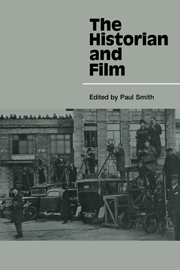Book contents
- Frontmatter
- Contents
- Preface
- The contributors
- Introduction
- I The raw material
- II Film as historical evidence
- 3 The evaluation of film as evidence
- 4 The fiction film and historical analysis
- III Film as historical factor
- IV Film in the interpretation and teaching of history
- Select bibliography
- Appendix: addresses of organisations involved with film and history
- Index
4 - The fiction film and historical analysis
Published online by Cambridge University Press: 05 November 2011
- Frontmatter
- Contents
- Preface
- The contributors
- Introduction
- I The raw material
- II Film as historical evidence
- 3 The evaluation of film as evidence
- 4 The fiction film and historical analysis
- III Film as historical factor
- IV Film in the interpretation and teaching of history
- Select bibliography
- Appendix: addresses of organisations involved with film and history
- Index
Summary
Historical analysis and the different types of film
All films are objects of analysis.
It is true that only newsreels and pieces of reporting are at present regarded as documents; fiction films, the ‘cinema’, are held to belong to the realm not of knowledge but of the imaginary; they are supposed to convey not reality but its representation. Hence today, through application to the image of the dogmas of the written tradition, only meagre credit is accorded to the scientific evidence of fiction. There is a strong tendency to assimilate it to the novel. Now, it is well known that ‘important’ men, scientists or politicians, administrators and decision makers put little faith in the imaginary, in the novel. In the East, they trust rather to figures, to statistics; in the West, to calculations of profitability. Like a shadow, historians and economists follow them along that road. But we know the results which that quasi-scientific faith has produced, for example in the East on agricultural production, which according to these people ought not to have stopped rising; in the West on the price of petrol, which according to the ‘experts’ ought not to have stopped falling.
So, through a kind of assimilation of film to writing, educated people tend to accept if absolutely necessary the evidence of the film document but not that of the film as document. The fiction film is despised, because it dispenses only a dream, as if the dream formed no part of reality, as though the imaginary were not one of the driving forces of human activity.
- Type
- Chapter
- Information
- The Historian and Film , pp. 80 - 94Publisher: Cambridge University PressPrint publication year: 1976
- 5
- Cited by



